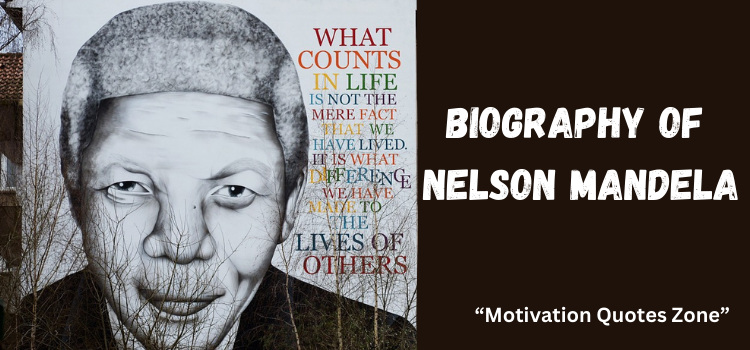Who is Nelson Mandela
Nelson Mandela is a notable South African leader, born on 18 July 1918 in Mvezo, South Africa. Nelson Mandela was an anti-apartheid leader who fought against racial injustice throughout his life. His unwavering commitment to justice led to his imprisonment for 27 years. After his release from prison in 1990, Nelson Mandela became a key negotiator to end apartheid. Became the first black president of South Africa in 1994. His presidency was marked by efforts to reconcile a divided nation, promoting forgiveness and unity. He died on December 5, 2013, leaving the people of South Africa in tears, the day the world lost a worthy leader, the end of a great African leader.
Nelson Mandela’s Early Life and Education
Mandela’s early years were marked by the cultural traditions of the Thembu people. In 1920, his father died, and Mandela was placed under the care of the Thembu regent, Chief Jongintaba Dalindyebo. Mandela received his primary education at a local missionary school and later attended Clarkebury Boarding Institute and Healdtown, a Methodist secondary school. Nelson Mandela as a child, spent most of his free time in the veld playing with other boys in the village.
In 1939, Mandela began studying law at the University of Fort Hare, the only higher education institution for black South Africans at the time However, Nelson Mandela was expelled for participating in a student protest. Mandela continued his studies at the University of Witwatersrand before completing his law degree at the University of South Africa. Subsequently, he worked as a clerk at a law firm and later established his practice, primarily focusing on cases of injustice and discrimination. Mandela’s early life and education laid the foundation for his later activism and leadership in the anti-apartheid movement, shaping him into the resilient and determined figure who would become a symbol of resistance and reconciliation.
How did Nelson Mandela die
Nelson Mandela died on December 5, 2013, at the age of 95 at his home in Houghton, Johannesburg, South Africa. Mandela’s health deteriorated due to a respiratory infection, and his death was attributed to a prolonged respiratory infection. Mandela suffered from respiratory problems for years and was hospitalized several times leading to his death. His death marked the end of an era and prompted an outpouring of grief and tributes from around the world.
Nelson Mandela’s political career: Nelson Mandela’s political career was deeply intertwined with the struggle against apartheid in South Africa.
Anti-Apartheid Activism: Mandela became involved in political activism during the 1940s, joining the African National Congress (ANC) in 1943. In 1944, he helped form the ANC Youth League, advocating for a more radical approach to ending apartheid. Nelson Mandela’s sole purpose was to end apartheid for which he fought till his death.
Defiance Campaign and ANC Leadership: Mandela played a prominent role in the Defiance Campaign against unjust apartheid laws in the early 1950s, employing nonviolent civil disobedience. As the ANC faced increasing government repression, Mandela was elected national president of the ANC Youth League in 1951. The ANC adopted the Freedom Charter in 1955, outlining a vision for a democratic and non-racial South Africa.
Arrest and Ravinia Trial: In 1962, Mandela was arrested on charges of sabotage and other crimes. He was sentenced to life imprisonment during the Ravinia Trial in 1964. Mandela and his co-accused were imprisoned on lonely Robben Island.
Imprisonment and International Pressure: Mandela spent 27 years in prison, becoming a global symbol of resistance to apartheid. International pressure mounted for his release, with the “Free Nelson Mandela” campaign gaining momentum.
Release and Negotiations: Mandela was released from prison on February 11, 1990, as South Africa began its transition away from apartheid. He played a crucial role in negotiations to end apartheid, leading to the first multiracial elections in 1994.
Election as President: In the historic 1994 elections, Mandela became South Africa’s first black president. His presidency focused on reconciliation, nation-building, and addressing the deep-seated inequalities of apartheid.
Post-Presidential Activism: After leaving the presidency in 1999, Mandela continued to work for peace, human rights, and social justice globally. He played a role in various diplomatic initiatives and focused on issues such as HIV/AIDS awareness and conflict resolution.
Nelson Mandela Family: Nelson Mandela had a complex family life marked by personal challenges and sacrifices due to his commitment to the anti-apartheid struggle.
First Marriage – Evelyn Mase (1944-1958): Mandela’s first wife was Evelyn Mase, and they were married in 1944. The couple had four children together: Thembekile, Makaziwe, Makgatho, and Makaziwe (who passed away in infancy). Evelyn and Mandela divorced in 1958.
Second Marriage – Winnie Madikizela-Mandela (1958-1996): Mandela’s second wife was Winnie Madikizela-Mandela. They married in 1958 and had two daughters, Zenani and Zindzi. Winnie played a significant role in the anti-apartheid movement while Mandela was imprisoned. Their marriage faced challenges, and they separated in 1992, divorcing in 1996.
Children: Mandela had six children: Thembekile (Thembi), Makaziwe, Makgatho, Makaziwe (who shares the same name as the deceased sister), Zenani, and Zindzi.
Makgatho Mandela’s Death: Tragically, Mandela’s son Makgatho passed away in 2005 due to complications from AIDS. Mandela openly discussed his son’s cause of death, So that South Africans could better know and understand about HIV/AIDS. Mandela contributed to raising awareness about HIV/AIDS in South Africa.
Third Marriage – Graça Machel (1998-2013): Nelson Mandela married his third and last wife, Graça Machel, in 1998. She was the widow of Mozambican President Samora Machel. Graça Machel played a supportive role in Mandela’s later years, and they were married until Mandela died in 2013—Graça Machel was the last wife of Nelson Mandela.
Achievements of Nelson Mandela
Nelson Mandela was the first African to be elected in a fully representative democratic election. Mandela received more than 260 awards in his 40-year career, most notably the Nobel Peace Prize in 1993. Nelson Mandela achieved remarkable accomplishments throughout his life, particularly in the context of his tireless efforts to dismantle apartheid in South Africa and promote reconciliation.
- Anti-Apartheid Activism: Mandela played a crucial role in the anti-apartheid movement, advocating for equal rights and opposing the racially discriminatory policies of the South African government.
- Founding Member of ANC Youth League: Mandela was a founding member of the African National Congress (ANC) Youth League in 1944.
- Defiance Campaign: Mandela actively participated in the Defiance Campaign against unjust apartheid laws in the early 1950s, employing nonviolent civil disobedience.
- Rivonia Trial: Despite facing charges of sabotage and other offenses, Mandela’s conduct during the Rivonia Trial in 1964 showcased his unwavering commitment to the anti-apartheid cause.
- Imprisonment and Global Symbol: Mandela’s 27-year imprisonment on Robben Island turned him into a global symbol of resistance to racial oppression.
- Release and Negotiations: Nelson Mandela’s release from prison in 1990 marked a turning point in South Africa’s history. He played a crucial role in negotiations to end apartheid, leading to the first multiracial elections in 1994.
- First Black President of South Africa: In the historic 1994 elections, Mandela became South Africa’s first black president, marking the end of apartheid and the beginning of a new era of democracy.
- Reconciliation and Nation-Building: Mandela’s presidency focused on reconciliation and nation-building.
- Truth and Reconciliation Commission: Mandela established the Truth and Reconciliation Commission (TRC) in 1995, providing a platform for victims and perpetrators of apartheid-era crimes to share their stories.
- Global Statesmanship: After leaving the presidency in 1999, Mandela continued to be a global statesman, advocating for peace, human rights, and social justice.
- HIV/AIDS Awareness: Mandela openly addressed the HIV/AIDS epidemic in South Africa, contributing to awareness and challenging stigmas associated with the disease. After Mandela’s son died of HIV/AIDS, his HIV/AIDS resistance activity increased.
Nelson Mandela’s achievements are not only in the political realm but also in his commitment to forgiveness, reconciliation, and building a more just and equitable society. His legacy continues to inspire people around the world-wide.
Summary of Nelson Rolihlahla Mandela
Nelson Rolihlahla Mandela was a South African anti-apartheid activist and politician who served as the first president of South Africa from 1994 to 1999. He was the country’s first black head of state and the first elected in a democratic election.
Born: July 18, 1918, Mvezo, South Africa
Died: December 5, 2013 (age 95 years), Houghton Estate, Johannesburg, South Africa
Children: Zindziswa Mandela, Zenani Mandela,
Spouse: Graça Machel (m. 1998–2013), Winnie Mandela (m. 1958–1996), Evelyn Mase (m. 1944–1958)
Grandchildren: Zoleka Mandela, Ndaba Mandela,
Awards: Nobel Peace Prize, Bharat Ratna,
Parents: Gadla Henry Mphakanyiswa, Noqaphi Nosekeni
If you want Nelson Mandela’s Book to Read more

